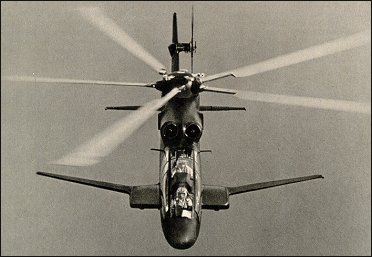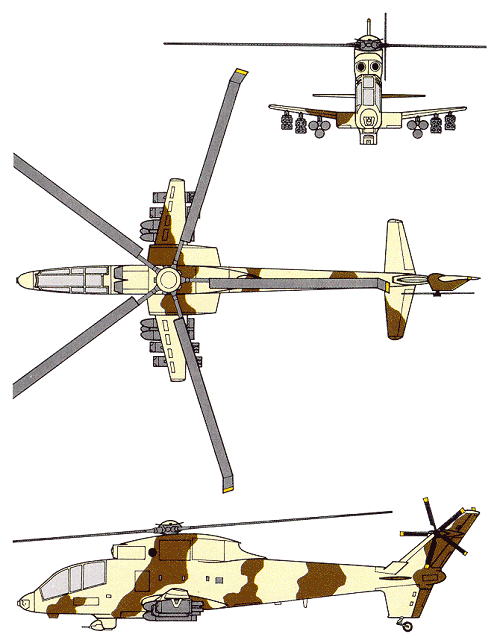
| Sikorsky S-67 project |  |
 |

| Sikorsky S-67 project |  |
 |
|
Sikorsky, who may rightly be considered one of the giants of the helicopter industry, has taken part in all the design competitions for combat helicopters held by the American armed forces. In 1964, it submitted the S-66 project to the US Army for the AAFSS specification, calling for an aircraft with a maximum speed of approximately 418km/h and ten minutes' hovering capability. The S-66 looked very much like the Lockheed AH-56A Cheyenne (which won the contest), but had a Rotorprop tail rotor which could rotate its axis through 90° to act both as a conventional anti-torque rotor in horizontal flight and as a pusher propeller, thereby transforming the S-66 into a compound aircraft in cruising flight. When the AH-56A failed to live up to expectations, Sikorsky first offered an intermediate aircraft, consisting of an armed version of the S-61, then designed a simplified AAFSS using the maximum number of components from the S-61. The result was the S-67 Blackhawk which appeared in 1970. The Blackhawk looked like a helicopter with conventional rotors (those of the S-61) and had the now typical lines and features of a combat helicopter: two stub wings with a 8.33m span and an all-moving tail plane. The main-wheels were retractable, while the tailwheel was not. One of the most interesting features of this aircraft was the presence of speed brakes on the wing trailing edges, which could be used both as airbrakes and to improve manoeuvrability. In addition the main rotor blade tips were modified and given a sweep-back of 20°, to reduce vibration, stall speed and noise. The Blackhawk was put through a long series of tests from 1970 to 1974 but judged unsatisfactory. It nonetheless established an E-1 class world speed record on 14 December 1970 by flying at 348.971km/h over 3km, beating this on 19 December with a new record of 335.485km/h over a 15/25km circuit. In the final stages of testing, the S-67 was fitted with night vision systems, a TAT-140 turret with a 30mm cannon and an insulated and soundproof compartment for troop transport. The S-67 was also designed to carry an armament of 16 TOW antitank missiles, 2.75 in rockets or Sidewinder air-to-air missiles. The Blackhawk demonstrated excellent manoeuvrability, weapon carrying capacity and versatility. At the end of the test cycle, the US Army asked for the aircraft to be modified by substituting a ducted fan for the tail unit, and in this configuration it reached a speed of 370km/h in a test dive in 1974. G.Apostolo "The Illustrated Encyclopedia of Helicopters", 1984  Sikorsky designed and developed the Sikorsky S-67 Blackhawk highspeed attack helicopter as a private venture. This combined two 1119kW General Electric T58-GE-5 engines and five-bladed main and tail rotors with a slender gunship fuselage, short-span 8.33m fixed wings, a cruciform tail unit with an all-moving horizontal surface, and retractable tailwheel landing gear. Highly manoeuvrable, the S-67 established on 14 December 1970 a new world-class speed record over a 3km course of 348.971km/h. Its development was abandoned after an accident in 1974. D.Donald "The Complete Encyclopedia of World Aircraft", 1997
|